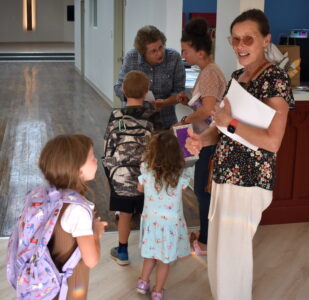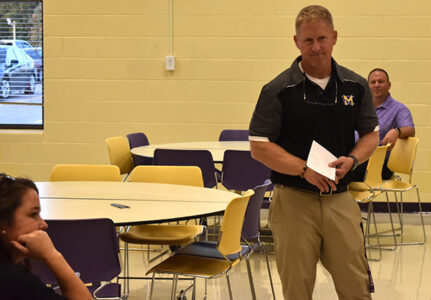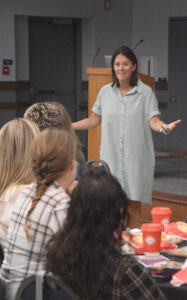Beating the odds: Marshalltown girl lives with rare genetic disorder known as NKH

T-R PHOTO BY LANA BRADSTREAM Landi Hodson is living with a rare genetic condition known as nonketotic hyperglycinemia, or NKH. This has been a big year for her as she completed third grade and Mayor Joel Greer proclaimed May 2 as Non-Ketotic Hyperglycinemia Awareness Day.
Landi Hodson faces insurmountable odds and has already overcome many challenges. Having been diagnosed with nonketotic hyperglycinemia (NKH), she was not expected to live as long as she has, as many people with the condition do not live beyond the age of eight.
NKH is a rare genetic, metabolic disorder which occurs when the body does not properly break down an amino acid called glycine. This results in an excess amount of glycine in the body and the brain, causing neurological issues.
Most of the time, NKH is diagnosed within the first week of life as the infant displays symptoms such as seizures, low muscle tone, fatigue and apnea. Her parents, Maureen Gummert and Shawn Hodson — who call themselves Landi’s “Grandmas” — said for someone to have NKH, both biological parents have to be carriers.
“Landi is more moderately affected,” Gummert said. “The kids who are severe, most don’t make it out of neonatal. Some 90 percent are tube fed. She’s never had a tube. Most are immobile and nonverbal, can’t move at all.”
Due to the neurological impact, Gummert said many people with NKH lie motionless and develop a respiratory illness which tends to be fatal. The disorder only affects one in 76,000 births throughout the world. There have not been a large number of people with NKH in Iowa, and Landi, 10, is the only child left with the disorder in the state.
“The only other child in Iowa [with NKH] passed away in Iowa a year ago,” Gummert said. “They were about the same age. He was eight or nine months older than Landi.”
Slowly, more knowledge of NKH is spreading. Mayor Joel Greer proclaimed May 2 as NKH Awareness Day, in conjunction with NKH Crusaders Worldwide Awareness Day. People at Landi’s school, Fisher Elementary, also wore yellow and black for the NKH international mascot – the bumblebee.
“Aerodynamically, for what the bumblebee is, it shouldn’t be able to fly, but it does,” Gummert said. “That’s the premise behind why it was chosen [as the mascot.]”
Day-to-day
Hodson and Gummert adopted Landi in 2018, but she has been with them since birth. Landi was diagnosed with NKH at 10 weeks of age. Hodson noticed when Landi came home from the hospital that her daughter would lay there and shake.
“I had never seen any other baby do that, so we knew there was something wrong right away,” she said.
Landi’s neurologist in Des Moines was the physician who diagnosed her, by administering a spinal tap and obtaining some cerebral spinal fluid to check for deficient enzyme activity which causes excess glycine.
Landi is not verbal, but Gummert believes she understands some words such as “Grandma,” “milk” and “bath.”
“We can tell by the noises she makes as to what she wants or what’s wrong,” Hodson said. “If she’s crying and she’s throwing a fit, there’s no tears. If she is crying and there’s tears, we know she’s hungry or there’s some sort of distress.”
She said Landi can cough, sit and move her limbs, but cannot stand or crawl. According to Hodson, Landi can move around on the floor by rolling or scooting. In fact, despite physical restrictions, Hodson said Landi is always moving.
“She never sits still unless she’s sleeping,” she said.
Landi’s condition has created a structured lifestyle with numerous medications. She awakes everyday between 5 and 6 a.m. so her parents can get her daily medications ready. According to Hodson, they have to prepare 11 syringes of different medications throughout the day.
“She gets her first four at 6 a.m.,” she said. “She also has a bottle because she still drinks formula. It has the vitamins and everything she needs. She drinks 7 ounces of milk with her meds and goes back to sleep.”
When it is not summer, Gummert and Hodson wake Landi again at 7:45 a.m. to get ready for school at Fisher Elementary. Hodson said they give her more medication at that time and Landi will take a “cat nap” or watch TV until the bus arrives at 9 a.m. and she gets another medication.
At lunch, Landi gets two more doses of medication.
“She eats a lot of pureed food, but she can also eat soft adult food like mashed potatoes, yogurt and cheese,” Hodson said. “She’s starting to eat meat now if it’s cut into little tiny pieces. She likes cookies and sweet stuff.”
At 2 p.m., there is another dose of medication, and two more at 3:30 p.m. with a bottle of milk. Landi will then sleep until supper time at 5 p.m., take more medications between 7 p.m. to 8 p.m. before she has another bottle and gets ready for bed.
Unfortunately, seizures are a daily part of Landi’s life, and Gummert said they always occur at night while she is sleeping.
“At about 10:30 every night, she has a seizure,” she said. “It’s not a grand mal. She wakes up and is somewhat alert. She knows it’s happening and it’s frightening for her. She does take CBD and THC which has helped with the severity and the amount.”
The regularity of the seizures cannot be explained. Gummert said the neurologist believes there is some kind of disconnection going on during her sleep cycle. It is also theorized Landi could be reacting to a difference in sound, as Hodson and Gummert turn the television off to go to bed at that time.
Hodson added that Landi will go back to sleep after seizures are over.
Despite the large number of medications, the schedule and the frightening seizures, Landi enjoys a variety of things. While in school, she would go swimming at the YMCA twice a month, and Gummert said Landi loved that. The family goes camping every weekend, which Landi also enjoys because she gets to ride in a boat. She also likes to spend time with her cousin.
Hodson said Landi has some traits of autism, as she does not like to be held or snuggled.
“She likes to be in the room with us, but she doesn’t want to be loved on unless it’s her cousin,” she said.
Going for walks in her wheelchair is also something that pleases Landi. When she’s inside, Landi likes to have the television on, and enjoys “Molly of Denali,” “Arthur” and “Curious George.”
“She doesn’t watch anything other than PBS Kids,” Gummert said.
Trial and error
Due to the rarity of the condition, Hodson said doctors do not know much about it. Gummert added all of the research money is raised by families of people living with NKH. There is not really a determined course of medication or action when it comes to treatment. Gummert said most of it is trial and error.
For example, Landi takes a preservative called sodium benzoate, which adheres to the glycine and helps Landi’s body expel it. Then there is dextromethorphan, which is a cough suppressant.
“A doctor did a study on it and it protects the blood-brain barrier and keeps the glycine from reaching the brain, which helps with the brain damage,” Gummert said. “There is so little known.”
The lack of knowledge has also created a network amongst NKH parents. Gummert will communicate with parents and they will share different treatments which have helped.
“Maureen will learn something from a group of parents online, and take it to the doctor and say this is what other parents noticed,” Hodson said. “We definitely know more about it than the doctors.”
Fortunately, Gummert said Landi’s neurologist is open to trying the suggestions.
“To me, feeding a kid cough medicine four times a day is outlandish,” Gummert said. “If they said an aspirin a day did something, he would be willing to try it. He would write the script and help us make it happen. That is helpful because some parents don’t have receptive neurologists.”
Thankfully, she said Landi gets Medicaid, but it is a consistent battle. Gummert has had to communicate with the state’s Congressional delegation to get Medicaid to cover the trial-and-error treatments. She said it would be approved for six months, but Landi will need it forever.
“So we just pay for it because it’s too much of a fight,” Gummert said. “I know that’s what insurance companies are counting on — families giving up. I’ve fought pretty hard for things. Initially they wouldn’t give her a case manager because she wasn’t sick enough.”
That determination was made because Landi was not in the hospital, but her parents kept her well enough to prevent hospitalizations. In fact, the last time Landi was hospitalized was 2016, which is not typical of NKH children.
“She’s generally healthy, aside from the NKH,” Gummert said.
——-
Contact Lana Bradstream at 641-753-6611 ext. 210 or lbradstream@timesrepublican.com.






